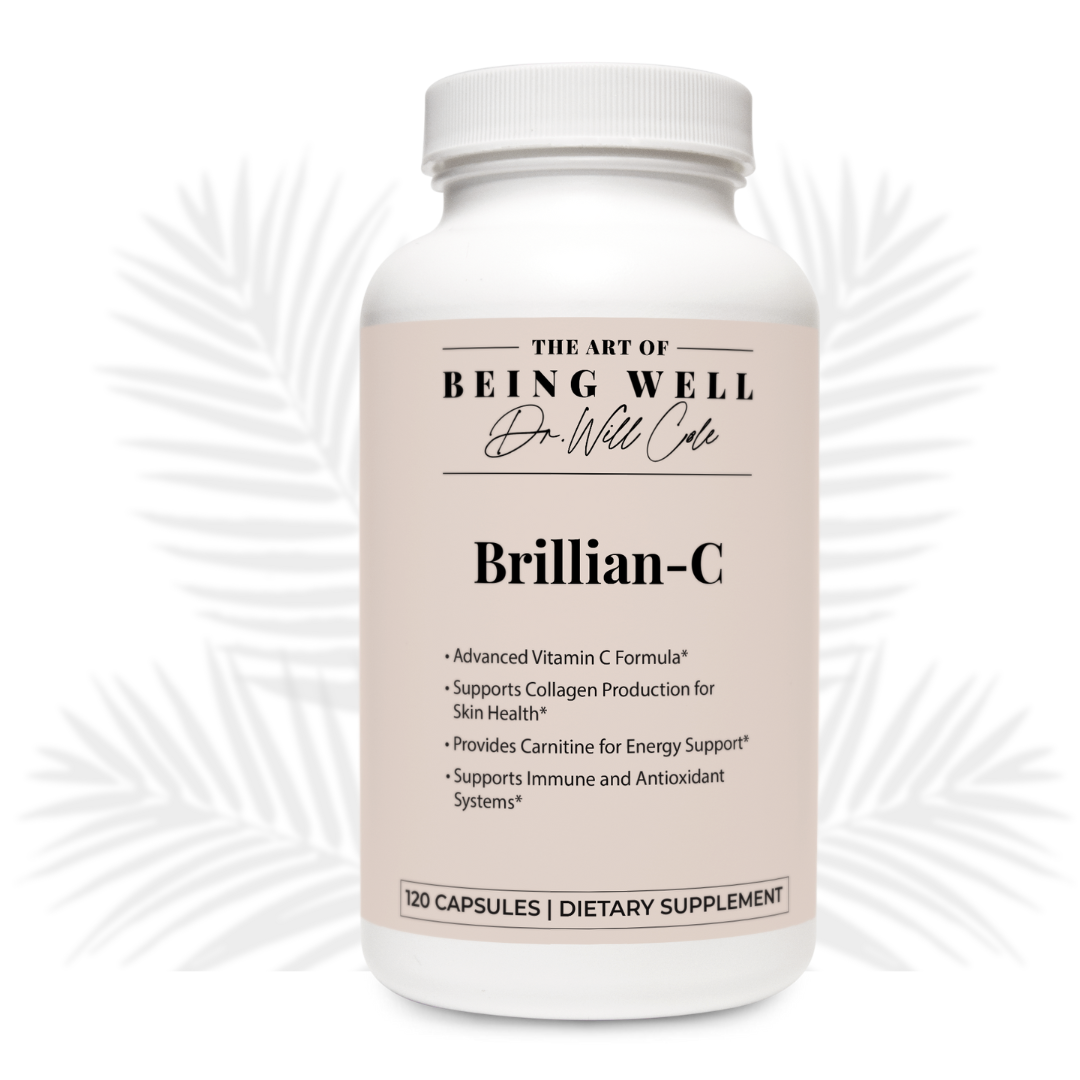What to Look For In a Vitamin C Supplement (Liposomal + Other Options)

Vitamin C is one of those nutrients you have to get from your diet. While a true deficiency is rare, many of us could use a boost.
That’s where vitamin C supplements come in. Vitamin C supplements are easily procured at any health food store or pharmacy, but are they all created equally? Like most supplements, the answer is no. You'll want to look for general markers of quality, like a reputable brand and a transparent ingredient label.
And while low doses of vitamin C supplements are usually pretty well absorbed, higher doses of many vitamin C supplements are not. So, to get the most benefits, you'll want to look for a type of vitamin C that is specially formulated for increased bioavailability. This may include liposomal vitamin C, or vitamin C formulated with a bioavailability-boosting ingredient like BioPerine.
As a functional medicine provider, I’m always looking for ways to make it more efficient for my patients to get the nutrients they need.
For some, that could mean a switch to a more bioavailable vitamin C supplement, especially if you haven’t responded much to generic supplements or need a higher dose.
A Closer Look At Liposomal Vitamin C
Liposomal vitamin C is a form of vitamin C, or ascorbic acid, encapsulated in liposomes. Phospholipids in these vitamins form a protective layer that mimics cell membranes, allowing the liposomes to deliver vitamin C more directly into the bloodstream and target tissues.
The result is a more effective delivery system that enhances the bioavailability of the vitamin. (1)
The liposomal form is popular with those who need a high amount of vitamin C to meet their nutritional needs. Just like with any supplement, it will take a few weeks to start seeing long-term benefits — but higher absorption rates can mean a more targeted approach.
Liposomal Versus Traditional Vitamin C
Is liposomal vitamin C better than regular vitamin C? Liposomal vitamin C is better than regular vitamin C if you’re looking for improved absorption and accessibility to fix a nutritional gap.
Your body only absorbs a fraction of vitamin C in the small intestine from traditional supplements because it has to pass through stomach acid and enzymes on its way to your cells. (2) Anything your body decides is excess comes out in your urine.
If you’re dealing with gut conditions or immune system disorders that can cause malabsorption, that can limit the effects of vitamin C supplements. This is where liposomal encapsulation shines. Studies show it has a significantly greater absorption rate than non-liposomal options. (3)
This doesn’t mean you should toss dietary supplements that don’t use liposomal technology to get you the nutrients you need. There are high-quality non-liposomal vitamin C supplements out there that boost absorption in other ways.
Vitamin C with Piperine for Increased Bioavailability
One of science's coolest and simplest tricks for boosting the bioavailability of a supplement is adding piperine extract.
Piperine is an ingredient found in black pepper, and it's been shown to increase the bioavailability of several nutrients, including vitamin C, selenium, and beta carotene.
The other thing I love about this option is that piperine also comes with additional health benefits, including reducing inflammation, boosting brain power, stabilizing blood sugar, and even helping to block cancer cell growth.
My vitamin C supplement is formulated using a high quality piperine extract called BioPerine, which is designed for optimal absorption by the body.
Shop This Article
My water-soluble vitamin C supplement is carefully curated with the addition of BioPerine, a proprietary black pepper extract that promotes bioavailability and boosts potency.
The Top 7 Benefits of Vitamin C
The benefits of specialized vitamin C supplements are the same as the benefits of regular vitamin C supplements, but potentially enhanced.
Enhanced absorption and bioavailability means more of the vitamin is reaching cell membranes. Let’s take a closer look at why that’s so important.
Supports Your Immune System
Vitamin C is essential for immune support. Your immune system uses antioxidants like vitamin C to produce antibodies, support healthy cell function, and fight back against oxidative stress. (4) Combined with zinc, vitamin C can even reduce the duration of the common cold.
Higher bioavailability vitamin C means that your immune cells are benefiting from getting enough of the antioxidants more efficiently. Healthy immune system function means you’re getting sick less often and reducing your overall chronic disease risk.
Promotes Healthier Skin
Vitamin C is necessary for the production of collagen, a protein that supports skin strength and elasticity. (5) Bioavailable vitamin C supports collagen synthesis by ensuring more vitamin C reaches your skin and connective tissues.
Keeping collagen production levels high supports healthier skin aging, improved tissue repair, and better wound healing. It’s not just great for wrinkles; it gives your skin its best shot at healing after traumas.
Vitamin C also fights free radicals generated by environmental factors like UV rays and pollution that can affect your skin.
Helps Fight Fatigue
Vitamin C boosts energy levels by maintaining a healthy immune system and helping your body synthesize carnitine, a molecule critical to energy-producing structures in your cells. (6)
Without sufficient carnitine, your body can’t effectively convert fats into energy. This can lead to physical and cognitive fatigue or brain fog.
Vitamin C's antioxidant effects are also crucial to energy levels. Vitamin C fights back against cellular damage, especially during times of chronic stress and inflammation.
You can reduce reverse inflammation symptoms naturally with the right tools. Learn more in my course, Mastering Autoimmune Conditions & Inflammation With Functional Medicine.
Supports Cardiovascular Health
Vitamin C’s antioxidant capabilities support improved circulation, reduced oxidative stress and inflammation, and a lower risk of atherosclerosis. Studies show the vitamin may help prevent the oxidation of LDL cholesterol, a predictor in heart disease, and improve lipid profiles. (7)
Vitamin C also supports healthier blood vessels, which can help regulate blood pressure and reduce tension in the vascular system.
Boosts Mood
Vitamin C is responsible for synthesizing important mood-boosting neurotransmitters like dopamine and norepinephrine. These neurotransmitters play a key role in regulating symptoms of depression and anxiety and managing oxidative stress in the brain. (8)
Improves Nutrient Absorption
Bioavailable vitamin C supplements don’t just mean improved absorption of vitamin C. By getting more vitamin C to where it belongs, you may improve your body’s absorption of other nutrients. I’ve already mentioned collagen, but iron is another nutrient that relies on vitamin C to enhance its absorption.
Healthy iron levels mean a lower risk of anemia, especially in women, better sleep, healthier skin, and a cognitive boost. It also helps your body synthesize certain hormones.
How To Take Vitamin C
Vitamin C comes as a liquid, powder, or capsule.
What is the recommended dosage for vitamin C? According to the National Institutes of Health (NIH), the recommended dietary allowance (RDA) of vitamin C for healthy adults over 19 is 90 mg for men and 75 mg for women.
Women who are pregnant should aim for 85 mg per day. The RDA for breastfeeding women is 120 mg. The upper limit for everyone is 2,000 mg of vitamin C per day.
Generally, all vitamin C is fine to take daily. Take vitamin C with or without food. If you’re not sure how to get started, talk to your healthcare professional, especially if you’re starting liposomal vitamin C during a pregnancy or on a detox plan.
Things To Consider
There are certain things you should look for when shopping for a new supplement. Before you buy vitamin C, here are some things to consider:
- Additives: The best brands have the fewest ingredients and lead with the active ones. You may see phospholipids from sources like sunflower lecithin. The supplements need these to bind effectively. Avoid supplements with unnecessary fillers and colors.
- Transparency: When you look up a brand, you should be able to learn more about where ingredients are sourced from and their manufacturing processes.
- Science: Brands should be able to provide clinical studies on the effectiveness of their products. Some even test their products through a third party.
Does vitamin C have side effects? There are very minimal side effects to vitamin C. If you do have too much, common adverse reactions are nausea, upset stomach, and diarrhea. That’s unlikely unless you’re over the daily maximum.
Finding The Right Supplements For You
The best supplement for you meets your unique health needs. You may benefit from the enhanced absorption of a liposomal vitamin C or one formulated with BioPerine, or you may not need one to address nutritional gaps. You may not know until you do some testing to find out where you’d benefit from a boost.
Functional medicine is about addressing the root of why you’re not feeling your best. If you’re interested in a holistic approach to supplements, schedule a consultation to begin your journey to long-term wellness.
View More At Our Store
Purchase personally curated supplements
and Dr. Will Cole’s books!

- Davis, J.L., Paris, H.L., Beals, J.W., et al. (2016). Liposomal-encapsulated ascorbic acid: Influence on vitamin C bioavailability and capacity to protect against ischemia-reperfusion injury. Nutrition and Metabolic Insights, 9, 25-30.
- Padayatty, S.J. & Levine, M. (2016). Vitamin C: the known and the unknown and goldilocks. Oral Disease, 22(6), 463-493.
- Khalili, A., Alipour, S., Fathalipour, M., et al. (2020). Liposomal and non-liposomal formulations of vitamin C: comparison of the antihypertensive and vascular modifying activity in renovascular hypertensive rats. Iranian Journal of Medical Sciences, 45(1), 41-49.
- Carr, A.C. & Maggini, S. (2017). Vitamin C and immune function. Nutrients, 9(11), 1211.
- Pullar, J.M., Carr, A.C., & Vissers, M.C.M. (2017). The roles of vitamin C in skin health. Nutrients, 9(8), 866.
- Tardy, A.L., Pouteau, E., Marquez, D., et al. (2020). Vitamins and minerals for energy, fatigue and cognition: A narrative review of the biochemical and clinical evidence. Nutrients, 12(1), 228.
- Morelli, M.B., Gambardella, J., Castellanos, V., et al. (2020). Vitamin C and cardiovascular disease: an update. Antioxidants, 9(12), 1227.
- Yosaee, S., Keshtkaran, Z., Abdollahi, S., et al. (2021). The effect of vitamin C supplementation on mood status in adults: a systematic review and meta-analysis of randomized controlled clinical trials. General Hospital Psychiatry, 71, 36-42.
The information on this website has not been evaluated by the Food & Drug Administration or any other medical body. We do not aim to diagnose, treat, cure or prevent any illness or disease. Information is shared for educational purposes only. You must consult your doctor before acting on any content on this website, especially if you are pregnant, nursing, taking medication, or have a medical condition.
Our content may include products that have been independently chosen and recommended by Dr. Will Cole and our editors. If you purchase something mentioned in this article, we may earn a small commission.

BY DR. WILL COLE
Dr. Will Cole, DNM, IFMCP, DC is a leading functional medicine expert who consults people around the globe, starting one of the first functional medicine telehealth centers in the world. Named one of the top 50 functional and integrative doctors in the nation, Dr. Will Cole provides a functional medicine approach for thyroid issues, autoimmune conditions, hormonal imbalances, digestive disorders, and brain problems. He is also the host of the popular The Art of Being Well podcast and the New York Times bestselling author of Intuitive Fasting, Ketotarian, Gut Feelings, and The Inflammation Spectrum.

Gut Feelings
Healing The Shame-Fueled Relationship
Between What You Eat And How You Feel

